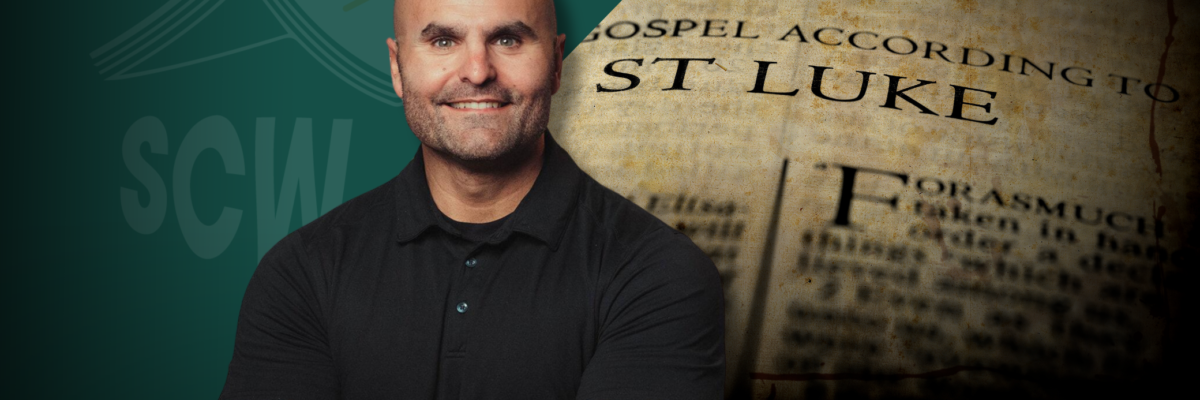
Episode 117: Year C – 6th Sunday of Ordinary Time
In today’s episode, we focus on a total of two details in the readings for this upcoming 6th Sunday of Ordinary Time. The first is found in the second reading, which is taken from 1 Corinthians 15:12, 16-20. The related topic is the historical credibility of the early Christian claim that Jesus rose from the dead. The second detail is found in the Gospel reading, which is taken from Luke 6:17, 20-26. The related apologetical topic is the historical reliability of the Gospels in general.
Readings: Click Here
Looking for Sunday Catholic Word Merchandise? Look no further! Click Here
Hey everyone,
Welcome to The Sunday Catholic Word, a podcast where we reflect on the upcoming Sunday Mass readings and pick out the details that are relevant for explaining and defending our Catholic faith.
I’m Dr. Karlo Broussard, staff apologist and speaker for Catholic Answers, and the host for this podcast.
In today’s episode, we’re going to focus on a total of two details in the readings for this upcoming 6th Sunday of Ordinary Time. The first is found in the second reading, which is taken from 1 Corinthians 15:12, 16-20. The related topic is the historical credibility of the early Christian claim that Jesus rose from the dead. The second detail is found in the Gospel reading, which is taken from Luke 6:17, 20-26. The related apologetical topic is the historical reliability of the Gospels in general.
Let’s start with the second reading, which is taken from 1 Corinthians 15:12, 16-20. Paul writes,
If Christ is preached as raised from the dead,
how can some among you say there is no resurrection of the dead?
If the dead are not raised, neither has Christ been raised,
and if Christ has not been raised, your faith is vain;
you are still in your sins.
Then those who have fallen asleep in Christ have perished.
If for this life only we have hoped in Christ,
we are the most pitiable people of all.
But now Christ has been raised from the dead,
the firstfruits of those who have fallen asleep.
The detail that I want to highlight is Paul statement in verse 19, “If for this life only we have hoped in Christ, we are the most pitiable people of all.”
Now, the selected passage for this Gospel leaves out important verses for our purposes here—verses 14-15, which reads, “If Christ has not been raised, then our preaching is in vain and your faith is in vain. We are even found to be misrepresenting God, because we testified of God that he raised Christ, whom he did not raise if it is true that the dead are not raised.”
These three verses, when combined, form an argument that some have called the “apostolic dilemma”: the disciples risk either damnation or the loss of everything for nothing if they’re lying about the resurrection.
Consider the first horn of the dilemma, articulated in verses 14-15. Paul argues that if Christ has not been raised, then “we are even found to be misrepresenting God.” In other words, if Paul and the other apostles still believed in the God of their forefathers and they were lying about the resurrection, then they would be guilty of perjury and thus would merit damnation. That’s not a winning option.
On the other hand, Paul says in verse 19 that if they live for this life alone, then they are to be pitied. The idea here is that if Paul and the apostles don’t care about offending God with a lie, and they simply live for this life alone, then lying about Jesus’ resurrection doesn’t make sense either. Why? They have nothing to gain and everything to lose, including their lives.
So, the “apostolic dilemma” can be summed up as follows:
P1: If we’re lying about Jesus’ resurrection, then either A) we make ourselves subjection to damnation on account of the lie, or B) we will lose everything and gain nothing.
P2: Neither A nor B is a worthy option for us.
C: Therefore, we’re not lying about Jesus’ resurrection.
Does this prove Jesus rose from the dead? No! Just because they weren’t lying doesn’t mean it was true. They may have been hallucinating, or perhaps had a vision of Jesus, etc. Such alternative explanations of the relevant details would need to be examined.
However, given Paul’s above “apostolic dilemma” argument, we can, at least, reject the so-called Conspiracy Theory as a worthy and reasonable theory.
Okay, let’s now turn to the Gospel reading, which is the so-called “Sermon on the Plain” in Luke 6:17, 20-26. I’m not going to read the entire passage, since there’s no one detail that I want to highlight. Rather, I simply want to address the more general question of whether what Jesus says here about the “beatitudes” in Luke’s Gospel is the same sermon recorded by Matthew in his “Sermon on the Mount.”
Apologetically, this is significant because some skeptics have appealed to differences in the two accounts as evidence that the Gospel writers aren’t reliable. In fact, they seem to contradict each other. Matthew says Jesus “went up on the mountain” (Matt. 5:1) and gave his disciples the teaching on the “Beatitudes,” whereas Luke says, “[Jesus] came down with them and stood on a level place [Gk., topou pedinou”—flat, or level, place] (Luke 6:17). Is it a mountain or a level place?
Concerning this alleged contradiction between Jesus going “up on the mountain” and Jesus coming down to a “level place,” the objection assumes a “level place” refers to a plain of sorts, an area that is not on a mountain. This is why many call Luke’s version of this sermon the “Sermon on the Plain.”
But the Greek phrase doesn’t suggest a “plain.” Rather, the Greek topou pedinou literally translates “a flat, or level, place.” If Luke wanted to convey that Jesus spoke on a plain, he would have used another Greek phrase. New Testament scholar Walter L. Liefeld writes,
If it were a plain, such as Jesus often used for his teaching near the sea, just the words epi pedinou would probably have been used.
Liefeld cites another New Testament scholar for support—Frederic Godet, in his A Commentary on the Gospel of St. Luke.
Moreover, the ideas of a “mountain” and a “level place” are not mutually exclusive. There can be flat or level places on a mountainside. Matthew chose the “mountain” image to emphasize Jesus as the New Moses. And, for whatever reason, Luke chose to highlight the “flat/level place” imagery.
So, at least on this score, the skeptic’s objection fails. There is no contradiction on account of this detail as to where Jesus gave the teaching.
But a skeptic still has the many differences between the two sermons to rely on for his challenge. So, what should we make of this?
Well, not much. One reason why the differences don’t prove historical unreliability is because it’s possible the authors weren’t intending in the first place to record the same specific sermon that took place at a specific place. Rather, the “sermons” are a collection of Jesus’ principal sayings that were often repeated and put within a context by the authors. As R. Ginns points out in his commentary on Luke in A Catholic Commentary on Holy Scripture,
A common opinion today is that both [Matthew and Luke] are a collection of [Jesus’] principal sayings which must have been often repeated. Both in Mt and Lk they appear in an artificial setting.
Liefeld affirms this as the more probable opinion. New Testament scholar Howard Marshall concurs. In his The Gospel of Luke: A Commentary on the Greek Text, part of the New International Greek Testament Commentary, writes,
It is generally accepted that one basic piece of tradition underlies the two Sermons and that both Evangelists (and possibly their predecessors in the transmission of the material) have expanded it and modeled it in accord with their own purposes (pg. 243).
Now, one might think that this just sells the farm to the skeptic because it further supports his claim that the Gospels are historically unreliable. But this is not the case because ancient authors weren’t obliged to give an exact “play by play,” “minute by minute” report of the events in Jesus’ life and ministry, intending every detail to be taken on a literal historical level.
Ancient authors had more leeway in recording history than what we expect as moderns. It was common for ancient authors to re-arrange material topically for the sake some purpose, without an intention for setting and other things to be taken literally.
So, if it is the case that this is Matthew and Luke are doing with the two sermons, then there’s no problem from a historical standpoint. They aren’t guilty of error because they weren’t intending the two “sermons” to be taken as the same sermon given in a specific place.
Finally, the differences can also be accounted for by the sermons being different sermons given at different times. As New Testament scholar Leon L. Morris puts it in his commentary on Luke, which is part of The Tyndale New Testament Commentaries:
Preachers usually make use of the same or different matter in different sermons, especially if they speak without a written script. This habit of preachers seems a better explanation of the combination of resemblances and differences than extensive editorial activity.
Regardless of which of the above options one takes in explaining the differences, we can be certain that such differences don’t entail a contradiction or historical unreliability.
Conclusion
Well, my friends, that brings us to the end of this episode of the Sunday Catholic Word. The readings for this upcoming 6th Sunday of Ordinary Time, Year C, provide us with some good material for apologetical discussions:
- We have Paul’s “apostolic dilemma’ that allows us to exclude the Conspiracy Theory as a plausible theory to explain the circumstantial details surrounding the alleged resurrection of Jesus, and
- We have details that allow for us to assess whether the Gospel writers, particularly Matthew and Luke, are historical.
As always, I want to thank you for subscribing to the podcast. And please be sure to tell your friends about it and invite them to subscribe as well through any podcast platform that they use. You can also access the archived episodes of the Sunday Catholic Word at sundaycatholicword.com.
You might also want to check out the other great podcasts in our Catholic Answers podcast network: Trent Horn’s The Counsel of Trent, Joe Heschmeyer’s Shameless Popery, Jimmy Akin’s The Jimmy Akin podcast, and Tim Staples “1 on 1 with Tim,” all of which can be found at catholic.com. And if you want to follow more of my own work, check out my website at karlobroussard.com
One last thing: if you’re interested in getting some cool mugs and stickers with my logo, “Mr. Sunday podcast,” go to shop.catholic.com.
I hope you have a blessed 6th Sunday of Ordinary Time, Year C. Until next time, God Bless.



